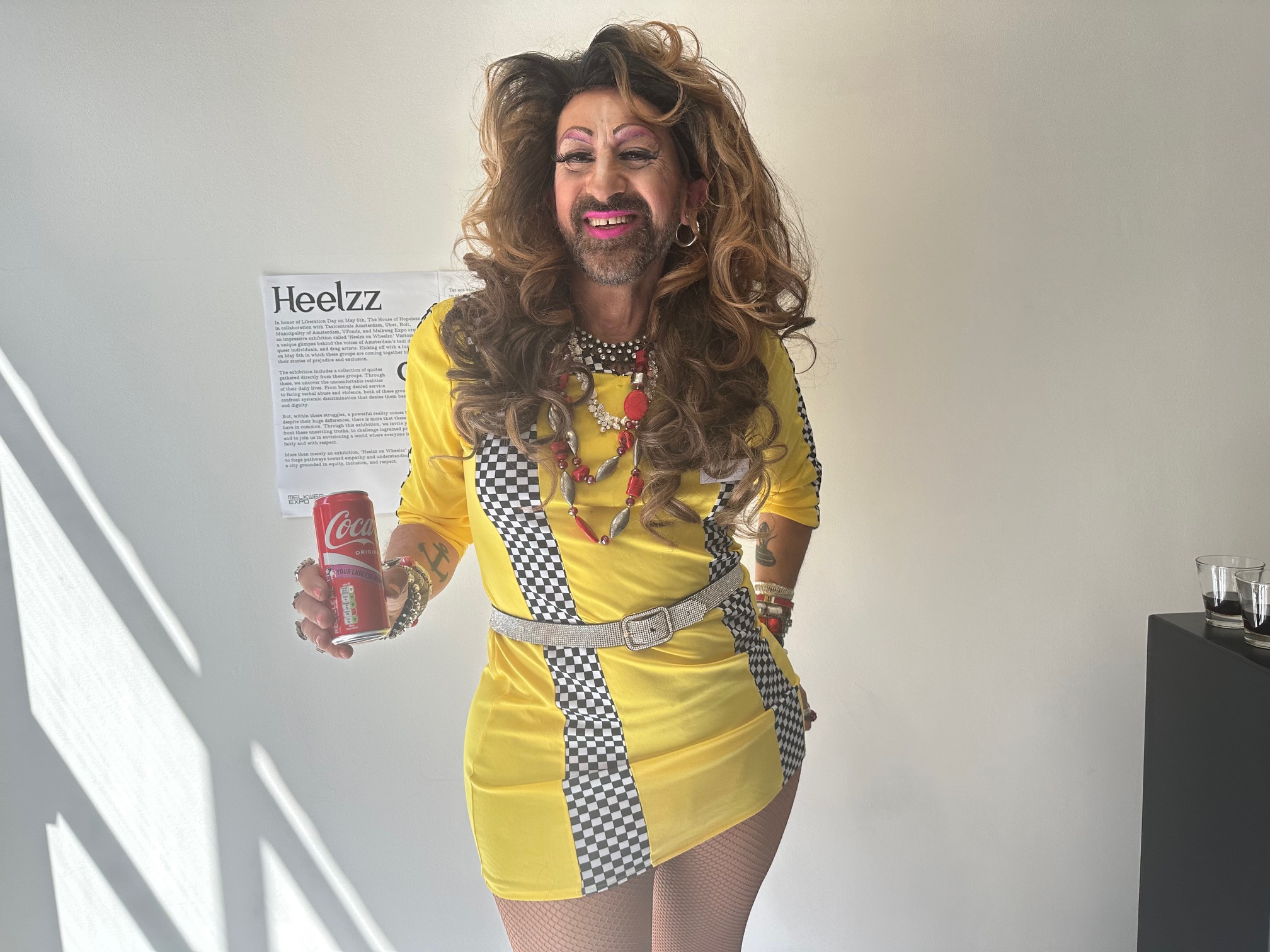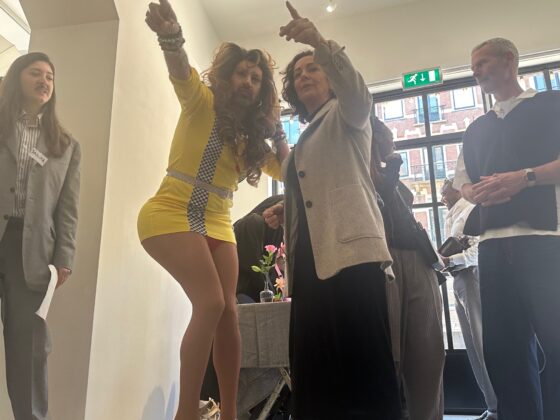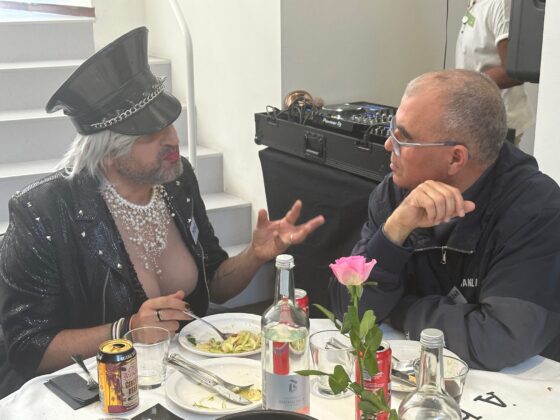Drag queens and drivers: Amsterdammers unite over discrimination
Lauren Comiteau
A new exhibition at Melkweg Expo, “Heelzz on Wheelzz”, unites drag queens and taxi drivers in an unlikely coalition.
You wouldn’t think drag queens and taxi drivers have a lot in common. But actually, these groups share a natural—or man-made—alliance: they’re bonded by discrimination.
On Sunday, Liberation Day, the two groups came to the table at Melkweg Expo for a vrijheidsmaaltijd, or freedom meal, to share not only lunch, but also their mutual stories of discrimination and to learn from each other.
“During the Second World War, the queer community was also persecuted,” noted Amsterdam Mayor Femke Halsema, who joined the festivities. “I think it’s very good that in a city like Amsterdam, we also remember that for the queer community, life is still very hard.”
Discrimination
Organizers say that part of that difficulty has to do with the discrimination LGBTI+ people face when trying to get around town, from threats and intimidation on public transport to being denied rides in the private sector.
“It was exactly 10 years ago that I got refused by a taxi driver for the first time,” says drag queen activist and one of the event organisers Jennifer Hopelezz. “It’s never gotten better. And it’s not only my story. For every drag performer and a lot of queer people, it’s impossible.”
Hopelezz says when taxis or Uber drivers see them in full drag, they’ll often delete the trip. “It’s very frustrating, because we’re usually working, we’re going to entertain,” she says of what she calls a real Amsterdam problem. “It seems to be kind of like a badge of honour for the drivers not to take us.”
At the same time, says Hopelezz, taxi drivers and those who work for ride-hailing apps like Uber and Bolt (co-organizers of the exhibit) also face discrimination because of their background, ethnicity or religion.

“The idea is to bring these two groups that normally never come together to share our stories and get empathy and understanding for the other,” she says. “We’re actually in the same industry. We’re in nightlife. We entertain and they bring the customers to our events and take them and us home. We should be allies.”
Vrijheidsmaaltijd
On a sunny Liberation Day, both jacket-wearing drivers and boa-draped drag queens sat at the same tables, sharing stories of discrimination and, mostly, listening. They received discussion questions to help move things along, including: “Are you ever worried working or going out at night? What can I do for you to make your experience as a driver/passenger better in the future?”
Vimal Kumar from India, an Uber and Bolt driver, says although he has never personally experienced discrimination, Uber invited him to the luncheon to hear the problems drag queen passengers face and work towards solving them. “They always need taxis, and I’ve picked them up so many times and there’s never a problem,” he says. “They are human beings, just like us. We don’t have any right to step on any person.”
But Italian performer and recording artist Stemin has experienced both discrimination and physical assault. “My boyfriend and I were biking, we were both wearing makeup and extravagant outfits, and my boyfriend was pushed from the bike and kicked to the ground,” he says. “We were called cancer homos and other slurs. These things happen everywhere, but what was the most shocking was to see that there wasn’t a big follow up from the police.
We felt very abandoned, like no one was actually seeing us.”
And when he is “seen,” it’s often by Uber drivers who don’t like the view. “You call an Uber, they drive towards you, they see you, and they drive off,” he says. “I would like for them to know that they are service providers, and we are paying for a service, and therefore we are expecting a service to be given. That behind the makeup, behind an outfit, there are individuals.”

Change, says Hopelezz, must come from the transportation companies themselves. “Some companies, like TCA [Taxicentrale Amsterdam, also a co-organizer], have a zero-tolerance policy towards discrimination,” she says. “But other companies don’t. So when I take a taxi, I now call TCA, and I’ll just say I’m in drag and tell the driver, and I never have a problem. But if I call Uber, you never know.”
Reporting
Danielle Jiskoot, founder of The Diverse Agency talent agency, was alerted to such incidents last year after a few of her clients got rejected by taxi drivers and two drag queens were hit by Uber drivers. She says she’s working with the big taxi companies to make incident reporting easier.
To that end, Hopelezz points out that Uber’s discrimination button was born in the city. “It started in Amsterdam, from the drag community, so things can change.”
Still, Jiskoot says that last year, the number of LGBTI+ discrimination complaints rose.
“There are always those peak moments,” she says. “Pride, for example, is a huge one, because there’s so many queer people out on the streets. And also around Christmas, when it’s getting colder and people need to take more cabs, is another time when you see peaks.”
She’s looking for policy changes, something that outgoing minister of justice and security Dilan Yeşilgöz was briefed on last month by gay and gender equality groups. According to LGBTI+ advocacy organization COC Netherlands, hatred and violence in the country are on the rise, and seven in 10 LGBTI+ people will experience violence at some point in their lives, their perpetrators mostly getting off scot-free.
Exhibition
Artist Anton Shebetko was asked to curate the accompanying exhibit at Melkweg Expo. His team interviewed both drag queens and taxi drivers and printed their quotes of discriminatory experiences on the plates that adorn the walls and the cloths covering the tables.
“The idea is that hatred is something you’ve been served, something you’ve been fed with…and you kind of clean the plate but serve it again,” he says. The quotes on the table are more empathetic, says Shebetko, with the goal of starting a conversation.
Visitors can write their own experiences and how they’ve dealt with them on the tables throughout the exhibition, which will be open through May 20.
Thank you for donating to DutchNews.nl.
We could not provide the Dutch News service, and keep it free of charge, without the generous support of our readers. Your donations allow us to report on issues you tell us matter, and provide you with a summary of the most important Dutch news each day.
Make a donation